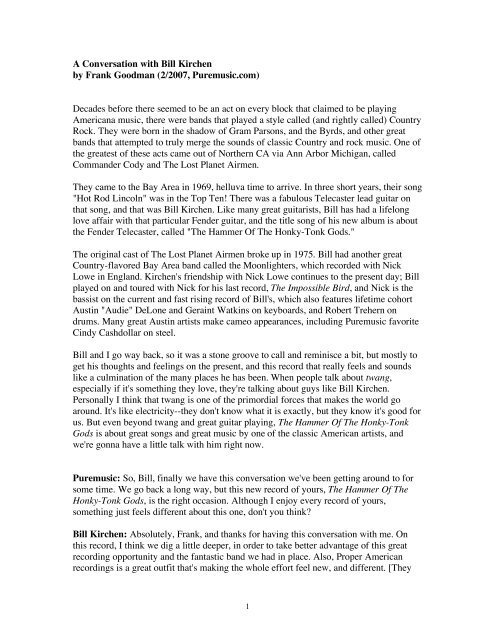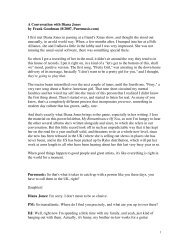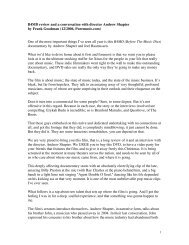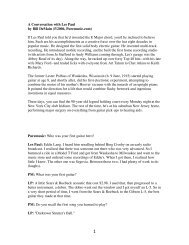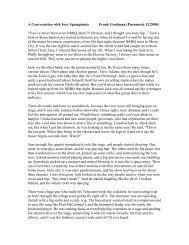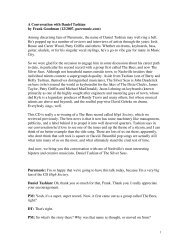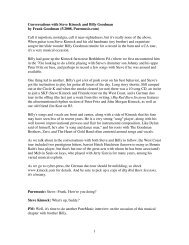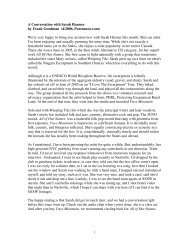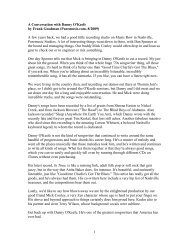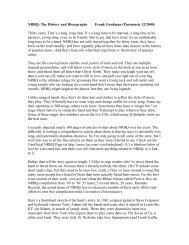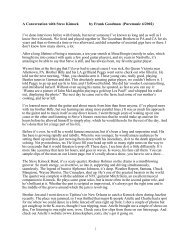A Conversation with Bill Kirchen by Frank Goodman (2 ... - Pure Music
A Conversation with Bill Kirchen by Frank Goodman (2 ... - Pure Music
A Conversation with Bill Kirchen by Frank Goodman (2 ... - Pure Music
You also want an ePaper? Increase the reach of your titles
YUMPU automatically turns print PDFs into web optimized ePapers that Google loves.
A <strong>Conversation</strong> <strong>with</strong> <strong>Bill</strong> <strong>Kirchen</strong><br />
<strong>by</strong> <strong>Frank</strong> <strong>Goodman</strong> (2/2007, <strong>Pure</strong>music.com)<br />
Decades before there seemed to be an act on every block that claimed to be playing<br />
Americana music, there were bands that played a style called (and rightly called) Country<br />
Rock. They were born in the shadow of Gram Parsons, and the Byrds, and other great<br />
bands that attempted to truly merge the sounds of classic Country and rock music. One of<br />
the greatest of these acts came out of Northern CA via Ann Arbor Michigan, called<br />
Commander Cody and The Lost Planet Airmen.<br />
They came to the Bay Area in 1969, helluva time to arrive. In three short years, their song<br />
"Hot Rod Lincoln" was in the Top Ten! There was a fabulous Telecaster lead guitar on<br />
that song, and that was <strong>Bill</strong> <strong>Kirchen</strong>. Like many great guitarists, <strong>Bill</strong> has had a lifelong<br />
love affair <strong>with</strong> that particular Fender guitar, and the title song of his new album is about<br />
the Fender Telecaster, called "The Hammer Of The Honky-Tonk Gods."<br />
The original cast of The Lost Planet Airmen broke up in 1975. <strong>Bill</strong> had another great<br />
Country-flavored Bay Area band called the Moonlighters, which recorded <strong>with</strong> Nick<br />
Lowe in England. <strong>Kirchen</strong>'s friendship <strong>with</strong> Nick Lowe continues to the present day; <strong>Bill</strong><br />
played on and toured <strong>with</strong> Nick for his last record, The Impossible Bird, and Nick is the<br />
bassist on the current and fast rising record of <strong>Bill</strong>'s, which also features lifetime cohort<br />
Austin "Audie" DeLone and Geraint Watkins on keyboards, and Robert Trehern on<br />
drums. Many great Austin artists make cameo appearances, including <strong>Pure</strong>music favorite<br />
Cindy Cashdollar on steel.<br />
<strong>Bill</strong> and I go way back, so it was a stone groove to call and reminisce a bit, but mostly to<br />
get his thoughts and feelings on the present, and this record that really feels and sounds<br />
like a culmination of the many places he has been. When people talk about twang,<br />
especially if it's something they love, they're talking about guys like <strong>Bill</strong> <strong>Kirchen</strong>.<br />
Personally I think that twang is one of the primordial forces that makes the world go<br />
around. It's like electricity--they don't know what it is exactly, but they know it's good for<br />
us. But even beyond twang and great guitar playing, The Hammer Of The Honky-Tonk<br />
Gods is about great songs and great music <strong>by</strong> one of the classic American artists, and<br />
we're gonna have a little talk <strong>with</strong> him right now.<br />
<strong>Pure</strong>music: So, <strong>Bill</strong>, finally we have this conversation we've been getting around to for<br />
some time. We go back a long way, but this new record of yours, The Hammer Of The<br />
Honky-Tonk Gods, is the right occasion. Although I enjoy every record of yours,<br />
something just feels different about this one, don't you think?<br />
<strong>Bill</strong> <strong>Kirchen</strong>: Absolutely, <strong>Frank</strong>, and thanks for having this conversation <strong>with</strong> me. On<br />
this record, I think we dig a little deeper, in order to take better advantage of this great<br />
recording opportunity and the fantastic band we had in place. Also, Proper American<br />
recordings is a great outfit that's making the whole effort feel new, and different. [They<br />
1
are an outstanding company that's also put out great records <strong>by</strong> The Hacienda Brothers,<br />
Bob<strong>by</strong> Purify, Andy Fairweather Low, and Dan Penn and Spooner Oldham.]<br />
PM: On this new album, there are two great outside songs, and songwriters you've<br />
covered before, in particular, that I'd like to talk about. The first is Blackie Farrell, and<br />
that great song, "Skid Row in My Mind."<br />
BK: Right.<br />
PM: Let's talk about Blackie a little. I don't really know much about him. You've covered<br />
a lot his great songs in your career.<br />
BK: Well, he's a friend of mine from northern California that I met early on when I got to<br />
California. Actually, let's see, it was serial--how would you put this? I was moving out of<br />
this woman's house, and he was moving in. And I had come back for my record<br />
collection, and he was eyeballing all my Hank Williams records.<br />
[laughter]<br />
BK: And we became fast friends. The first song that he ever wrote that I recorded was<br />
"Mama Hated Diesels," on our second album. [<strong>Bill</strong> is referring here to the second album<br />
of Commander Cody and The Lost Planet Airmen.]<br />
PM: A classic.<br />
BK: I've realized lately that I've been basically recording one per album at least of his<br />
material ever since then, <strong>with</strong> very few exceptions.<br />
PM: Wow.<br />
BK: He's just a very good friend, and I think a very wonderful songwriter.<br />
PM: You've done, what, "Sonora's Death Row," "Trying to Turn Her Memory Off,"<br />
"One More Hour of the Blues," and others. Right?<br />
BK: That's exactly right. The opening act just last night did a song he wrote called<br />
"Connie"; Connie worked at the New Highway Cafe.<br />
PM: So is Blackie Farrell making his own great records somewhere?<br />
BK: Well, it's funny you should say that, because that is finally about to happen. I was<br />
talking to Blackie recently, I said, "Man, we've got to hurry up and get you in a studio, so<br />
this can be your first record, not your only one."<br />
PM: Right. Yeah, because I'm going to have to get <strong>with</strong> him when that comes out and try<br />
to spread the word around, because he is just an outstanding songwriter.<br />
2
BK: Did you know him when you were in California?<br />
PM: I've never met the man. I can't believe it. But I certainly do know very well another<br />
rare gentlemen and great songwriter we both like a lot, and that's Joe New.<br />
BK: Oh, yeah. And Joe and Blackie were good buds for quite a while; still are, I'm sure,<br />
although Joe has moved, I understand, to Oregon. Right?<br />
PM: Yeah, he lives in Portland now, or thereabouts.<br />
BK: Wow.<br />
PM: And you've also covered Joe's great songs before, who contributed "Soul Cruisin'"<br />
to this record.<br />
BK: Right. I certainly have. And "Soul Cruisin'" is a song that actually I recorded on that<br />
Moonlighters album <strong>with</strong> Tony singing it, back when I went to England, the Nick Lowe<br />
and The Moonlighters album, and Paul Riley engineered.<br />
PM: Wow.<br />
BK: And a lot of those English guys heard it then. I've heard Paul Carrack sing this song.<br />
PM: I thought I'd heard a Carrack version.<br />
BK: That's right, although it isn't on record, to my knowledge. It only exists like on live<br />
cuts of his.<br />
PM: Right. But I've heard it somewhere. Yeah, on the Internet or something.<br />
BK: Yeah, exactly. So a lot of people had their shot at that song, and I thought, well, it's<br />
my turn. [laughs]<br />
PM: Definitely. And Joe New--I know, probably you feel the same way--is one of my<br />
favorite songwriters, and just a really soulful dude.<br />
BK: He really is, yeah. He's just a classic fella. He wrote "The Heart is a Muscle," that<br />
we covered. [Joe New also penned the John Mellencamp song, "China Girl."]<br />
PM: Did you cover it <strong>with</strong> your band or--<br />
BK: Yeah, I covered it on a record on--oh, shoot, I think--I can't remember if it was a<br />
Hightone or a Black Top record, but one of my records.<br />
PM: Now, what's the second line--"the heart is a muscle, you got to"--what?<br />
3
BK: --"you've got to exercise it every day."<br />
PM: Right. [laughs]<br />
BK: That's a good song, right?<br />
PM: Fantastic. But along <strong>with</strong> those two great songs, I think the other thing about the<br />
Hammer of the Honky-Tonk Gods that's really prominent is that, as a whole, it's very<br />
song-centric.<br />
BK: I think so, too. I abandoned the truck driving concept. I tried to steer away from<br />
novelty for novelty's sake. And I really made an effort, you know--it's hard for me to talk<br />
about it in a way, just because it sounds weird me saying it, but I really did make an<br />
effort to certainly find the best songs I could. I was thinking, man, I got the A-Team on<br />
this record, I just can't show up <strong>with</strong> a bunch of songs that I made up myself in my spare<br />
time.<br />
PM: And you didn't necessarily want to do the Dieselbilly thing.<br />
BK: Right. And why try to make a very traditional American sounding record, a record<br />
that sounded like traditional Americana from circa '67? Why do that if I'm in England<br />
<strong>with</strong> some of the best musicians that I know--Audie DeLone, Robert Trehern, Nick<br />
Lowe, and Geraint Watkins.<br />
PM: Yeah. That's an unbelievable band.<br />
BK: I put in more time songwriting on this one than I ever have, too. I carved a bunch of<br />
time out of my life to go write, which I've never done before. It's always been in between<br />
touring and taking out the garbage and whatnot.<br />
PM: [laughs] Which is, I mean, a crazy approach to a musical man's life. But that's what<br />
happens.<br />
BK: Yeah, it is. Yeah, if you do step back and look at it, it's like, wow, you could have<br />
actually taken some time on this, my man.<br />
PM: [laughs] You could have written a whole bunch more songs, yeah.<br />
BK: Yeah. But it doesn't come easy to me. Writing is something I have to just force<br />
myself to do, but I certainly like it once I get over it.<br />
PM: Some of my favorite writers are that way; that it just does not come easily to them.<br />
It certainly never came easy to Jerry Garcia. He considered it excruciating.<br />
BK: Is that right?<br />
4
PM: Yeah.<br />
BK: Wow.<br />
PM: It was a real chore. But he certainly turned out a trunk of good songs.<br />
BK: That's right, absolutely.<br />
PM: Along <strong>with</strong> the two great songs and writers we mentioned, we've got to pay tribute<br />
to, "If It's Really Got To Be This Way," as well, penned <strong>by</strong> the immortal Arthur<br />
Alexander, Donnie Fritz, and Gary Nicholson.<br />
BK: Oh, yeah. What a wonderful writer that guy is. I really didn't know anything about<br />
him until I saw his sort of a comeback concert in Austin at the Broken Spoke when he'd<br />
been rediscovered.<br />
PM: Ah.<br />
BK: And I was just stunned <strong>by</strong> that. And then of course, once you hear him, I realized I'd<br />
known a fair number of his songs.<br />
PM: Of course.<br />
BK: From the Beatles, for instance.<br />
PM: "Anna," and "You Better Move On," and "Go Home Girl," and--<br />
BK: "Soldier of Love." Then when I was working <strong>with</strong> Nick, he did a couple of Arthur<br />
Alexander songs.<br />
PM: So he's probably one of those blues/R&B artists that the English know better than<br />
the Americans do.<br />
BK: Exactly. You're exactly right. I'm sure that's where his royalty checks were coming<br />
from in the period of life that he wasn't in the public eye.<br />
PM: So how did that particular song come to your attention? At that show, or records--<br />
BK: No. It was shown to me my Peter Bonta, who is a gentleman that co-produced or<br />
engineered a bunch of records for me in his studio called Wally Cleaver's in<br />
Fredericksburg.<br />
PM: [laughs]<br />
5
BK: That was the main place I recorded. It started out as kind of a joke, a pun on Wally<br />
Heider's [legendary SF studio and remote recording company], and it turned into a fullbore<br />
studio.<br />
PM: [laughs]<br />
BK: But Peter turned me onto that song, he pitched it to me.<br />
PM: Is Nashville mega-writer Gary Nicholson a friend of yours, on that co-write there?<br />
BK: No. I don't know who that is.<br />
PM: Oh, you got to get up <strong>with</strong> Gary Nicholson, he's written hundreds, probably<br />
thousands of songs that you would find very appropriate.<br />
BK: Very cool.<br />
PM: Yeah. He's a great R&B and country writer, who's written <strong>with</strong> all the greats. And<br />
that's apparently one he penned <strong>with</strong> Arthur.<br />
Your wife, Louise, a great singer and writer herself, shows up on this song-centric<br />
recording as one in a three-way, if you'll pardon the expression, on "Get a Little Goner."<br />
BK: Right. Yeah, Sarah Brown had quite a bit of that already. She had half the chorus at<br />
least, and the whole idea of a relationship that's hard to end because the person keeps<br />
popping up, and the product and prospect of a life together keeps popping up.<br />
PM: Wow.<br />
BK: So we sat down and the three of us carved that one out, that was fun. That was a<br />
good three-way co-write. I'd written both <strong>with</strong> Sarah singly and <strong>with</strong> my wife singly, and<br />
I think Louise and Sarah had also written together. So all three pairs had written but<br />
never as a three-legged stool. And there's something nice about that, I guess you know<br />
that.<br />
PM: Oh, yeah. It's my new favorite way to write.<br />
BK: Yeah. Well, I can see why, just from that one experience. I thought it brought out<br />
the best in us, and it stopped any kind of sidetracks fairly quickly somehow.<br />
PM: Well, there's a kind of around-the-horn-ness about it, in baseball terms, that really<br />
gets the chemistry moving at a better rate, makes the molecules go faster.<br />
BK: Yeah, yeah. I think I know what you mean, yeah.<br />
6
PM: So Sarah Brown, she's the one who sang <strong>with</strong> you at the last Americana Conference,<br />
and also wrote, "If The Truth Be Told," right?<br />
BK: That's right, yeah. And she's a friend of mine from Ann Arbor. Actually, I went to<br />
high school <strong>with</strong> her big sister in Ann Arbor.<br />
PM: Wow.<br />
BK: Sarah went on first to Boston and then to Austin, and became quite a prominent bass<br />
player. And she was the house bass player at Antone's in Austin for a number of years.<br />
She's toured <strong>with</strong> a lot of interesting people. She's also played on the road <strong>with</strong> Paul<br />
Carrack. She toured <strong>with</strong> Albert Collins a lot.<br />
PM: Wow!<br />
BK: I'm blanking at the moment on other famous acts--she tended to work a lot in the<br />
blues idiom. She also wrote tunes that were covered <strong>by</strong> significant acts--I think Etta<br />
James has a good cover of a Sarah Brown tune, but the title escapes me right now.<br />
PM: Boy, I hope to meet her sometime. What an interesting person.<br />
BK: Yeah, she is. She's always ripe, too, she'd always be up for a co-write.<br />
PM: Thanks.<br />
You're such a good guitar player that, outside of Washington DC where you've been<br />
lavished <strong>with</strong> every music accolade known to man, some people don't realize what a great<br />
songwriter you are. In particular on this record, "Working Man" is an outstanding<br />
number.<br />
BK: Oh, <strong>Frank</strong>, thanks so much. I'm glad you like that.<br />
PM: Fantastic song, and just a great, great hook--"a working man doesn't understand why<br />
he can't afford a ticket to the promised land"--I mean, that's--as songwriter friends of<br />
mine would say, that's a Hall of Fame hook.<br />
BK: Ah, well, I don't know about that, but thank you very much. That was heartfelt, just<br />
watching the wealth gap get startlingly wider just in my adult lifetime, watching the top<br />
one percent triple the percentage of the wealth that they control. So that's where that came<br />
from.<br />
PM: Absolutely.<br />
BK: "Rocks in the Sand" came about because I was in England when there was that trial<br />
in Delaware, Pennsylvania, and they were attempting to force--they were calling it<br />
7
intelligent design, which was in fact creationism, they were attempting to force that into<br />
the school curricula as science.<br />
PM: Right.<br />
BK: And it went to trial, and a Judge, in my mind very rightly, said, "No, no, no, no, no,<br />
that's not--this is a disingenuous stunt here to mix religion and science, church and state."<br />
So anyway, I was in England, annoyed <strong>by</strong> that whole development. Before the verdict<br />
came out, I was worried that they were going to get away <strong>with</strong> it. And that song started as<br />
a rant, as an anti-creationist rant. It turned into, luckily, as Sarah put it, more of a<br />
meditation.<br />
PM: Right. It's a great song. I also like "One More Day," and of course, the title song,<br />
"The Hammer of the Honky-Tonk Gods." I read that you and Elvis Costello did that<br />
together at the recent Hardly Strictly Bluegrass Festival in SF's Golden Gate Park.<br />
BK: Yes. He borrowed that name of the song and album for his band name at the Hardly<br />
Strictly. He wanted to do something different.<br />
PM: [laughs] Fantastic.<br />
BK: So he called it "Elvis Costello and the Hammer of the Honky-Tonk Gods." And he<br />
let me sing that, yeah. We've got a YouTube of me singing it, but the guy was worried<br />
about getting busted <strong>with</strong> his camera, so it's just a shot between the shoulders of Elvis<br />
playing rhythm and kind of nodding along. It looks like he's doing a good job on the<br />
rhythm guitar, too, I must say.<br />
PM: Oh, yeah. Many people don't realize what a good guitar player he is. Is Elvis a good<br />
buddy of yours? What kind of a guy is he?<br />
BK: Well, he's not a good buddy, but I consider him a friend. I run into him occasionally,<br />
and I'm always very happy to see him, and I've done a few jobs <strong>with</strong> him. He's a very<br />
interesting guy. It was very educational for me--when I played that show <strong>with</strong> Elvis, I had<br />
to go back and learn a bunch of stuff; when you have to learn it, you have to listen a lot<br />
closer, of course. And it redoubled my awe for him as a songwriter. Also, I'd just seen<br />
him and Alan Toussaint together, and I thought, man, this guy can certainly stand up next<br />
to Alan Toussaint on stage.<br />
PM: Right, the way few can.<br />
BK: The way few can, exactly. Elvis and Alan were stunning, it just was. It was<br />
wonderful to see some of Elvis's songs--of course, it was wonderful to see Alan<br />
Toussaint, that just made the hair on my neck go up. But just to see Elvis's songs recast in<br />
a new light gave me newfound respect for him.<br />
8
PM: Now, "Heart of Gold," that was written <strong>by</strong> Tony Johnson. That's the fine musician I<br />
remember from [<strong>Bill</strong>'s SF band] The Moonlighters, right?<br />
BK: That is exactly right. And Tony wrote it, in fact, as a beautiful waltz. I tried to cut it<br />
as a waltz, and I just couldn't, somehow. It was just laying there, you know. I couldn't<br />
make it happen, and I liked the song so much. I was talking to Dave Gonzales about it-he's<br />
from the Paladins and from the Hacienda Brothers--we were touring <strong>with</strong> the<br />
Hacienda Brothers at the time. And he had a waltz he wanted me to do. And I said, "No, I<br />
got a waltz already. I don't really want to put two on the record."<br />
PM: No.<br />
BK: And he said, "Well, man, let me hear your other song." And he says, "Oh, no, no.<br />
You got to do that song like a twist beat, a boom papa oompa, oompapa."<br />
PM: Wow!<br />
BK: And I thought, no, no. I'll do it the way it is. But then I got to thinking about how I<br />
couldn't deliver it as a waltz, I got to thinking that he was dead right, that it made a very<br />
nice rock 'n' roll song. And it changed the meaning of the lyric. The lyrics went from sort<br />
of a poignancy to a swagger. But I think that's the mark of a good song, it stands up well<br />
to rough treatment.<br />
PM: Absolutely.<br />
[laughter]<br />
PM: And speaking of guys <strong>with</strong> whom you go way back, the outstanding multiinstrumentalist<br />
and great vocalist Austin [Audie] DeLone figures prominently into this<br />
record.<br />
BK: And he's the guy rockin' out on the piano on that very song. That was all one take. I<br />
was playing six string baritone guitar on that. I overdubbed the guitar solo towards the<br />
end, but the rest of that is just live singing and playing <strong>by</strong> people in the studio.<br />
PM: Wow.<br />
BK: And Audie is the greatest. I always travel as a trio unless I can get Audie, and then I<br />
travel as a quartet. That's basically how I've noticed my life works.<br />
PM: That's a hell of a testament. As regards to the past, what's become of George Frayne,<br />
the Commander himself, what's he up to?<br />
BK: Well, he still tours as the Commander. And he lives now in upstate New York area,<br />
in I believe Saratoga Springs area.<br />
9
PM: And what about <strong>Bill</strong>y C. Farlow, or Bruce Barlow, or--<br />
BK: Bruce Barlow is still in Marin County, and he's got a writing project <strong>with</strong> his wife,<br />
Pam, that they're working on. And <strong>Bill</strong>y C. continues to tour and put out records. He just<br />
made a new one not too long ago in Marin County. <strong>Bill</strong>y lives in northern Alabama, not<br />
too far from you there.<br />
PM: Wow. Well, thanks for indulging me about the past. But this new record is<br />
deservingly rocketing up the Americana chart, and certainly promises to be another<br />
watermark in a long distinguished career.<br />
BK: Well, <strong>Frank</strong>, I really appreciate the interest you take in it. And it's great to talk to<br />
you again, man. You're someone from my past that I'm always just delighted to see. So I<br />
hope I get to see you more come March, and I hope I get to come through Nashville. I got<br />
to figure out some place to play in Nashville. I've kind of lost the page there.<br />
PM: Okay. Well, let's talk about that, and let me see if I can help you book the right<br />
show in town.<br />
BK: Yeah, we'll come up <strong>with</strong> that sometime. And you seem to be thriving, and I hope<br />
that continues.<br />
PM: Thanks, yeah. Life is great, and it's getting better. And I look forward to seeing you<br />
and Louise at our next opportunity.<br />
10


